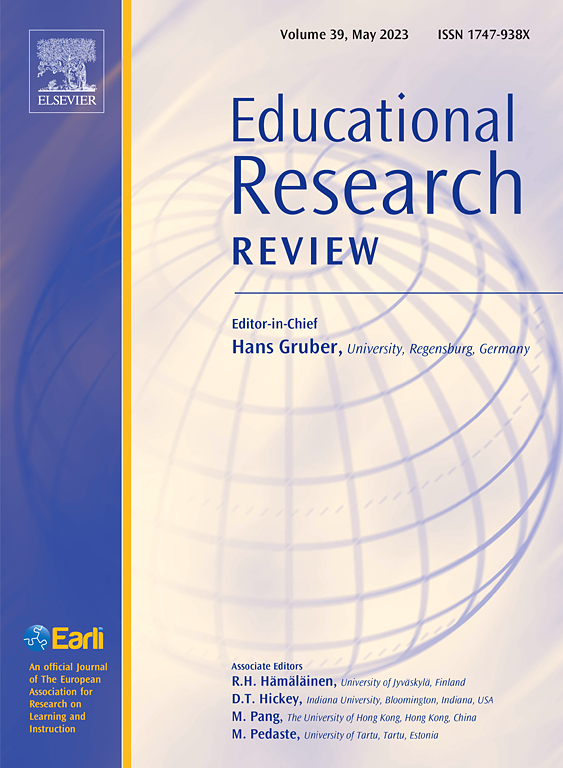Using learning progress monitoring to promote academic performance? A meta-analysis of the effectiveness
IF 10.6
1区 教育学
Q1 EDUCATION & EDUCATIONAL RESEARCH
引用次数: 0
Abstract
Individualised learner-centred teaching requires the continuous monitoring of students’ individual learning progress. A promising approach that uses recurrent short tests to measure individual learning progress and report the progress to teachers (and students) is learning progress monitoring (LPM). Although some findings suggest that LPM may positively impact student performance, there is also a large heterogeneity in prior results. The present meta-analysis examines the conditions under which LPM effectively improves students’ academic performance compared to business-as-usual instruction. We included 87 effect sizes from 25 studies published before June 2024, including a total of 7,379 students. These studies show a small positive effect (g = 0.30) of LPM on students’ reading, writing, and mathematics performance. Moderator analyses showed that the effect of LPM on academic performance was greater when (i) ongoing consultation was provided for teachers during the implementation of LPM and (ii) teachers received data-specific support on how to adjust their teaching. Moreover, our findings suggest that LPM tests should be administered at least weekly to be effective. Overall, our results show that LPM is well suited to addressing the challenges of student heterogeneity for students with and without educational needs. However, further research is needed to investigate in more detail the mechanisms underlying the effectiveness of LPM, particularly concerning the specific content and the extent of the support that needs to be provided to teachers to maximise the potential of LPM.
利用学习进度监控提高学习成绩?有效性的荟萃分析
个性化的以学习者为中心的教学需要持续监测学生的个人学习进展。学习进度监测(LPM)是一种很有前途的方法,它使用周期性的短测试来衡量个人的学习进度,并向教师(和学生)报告进度。虽然一些研究结果表明LPM可能会积极影响学生的表现,但在先前的结果中也存在很大的异质性。本荟萃分析考察了与常规教学相比,LPM有效提高学生学习成绩的条件。我们纳入了来自2024年6月之前发表的25项研究的87个效应量,共包括7379名学生。这些研究表明,LPM对学生的阅读、写作和数学表现有一个小的积极影响(g = 0.30)。主持人分析显示,当(i)在实施LPM期间为教师提供持续的咨询和(ii)教师获得关于如何调整教学的具体数据支持时,LPM对学习成绩的影响更大。此外,我们的研究结果表明,LPM测试应至少每周进行一次才能有效。总的来说,我们的研究结果表明,LPM非常适合解决学生异质性的挑战,无论是有教育需求的学生还是没有教育需求的学生。然而,需要进一步的研究来更详细地调查LPM有效性的机制,特别是关于需要向教师提供的具体内容和支持程度,以最大限度地发挥LPM的潜力。
本文章由计算机程序翻译,如有差异,请以英文原文为准。
求助全文
约1分钟内获得全文
求助全文
来源期刊

Educational Research Review
EDUCATION & EDUCATIONAL RESEARCH-
CiteScore
19.40
自引率
0.90%
发文量
53
审稿时长
57 days
期刊介绍:
Educational Research Review is an international journal catering to researchers and diverse agencies keen on reviewing studies and theoretical papers in education at any level. The journal welcomes high-quality articles that address educational research problems through a review approach, encompassing thematic or methodological reviews and meta-analyses. With an inclusive scope, the journal does not limit itself to any specific age range and invites articles across various settings where learning and education take place, such as schools, corporate training, and both formal and informal educational environments.
 求助内容:
求助内容: 应助结果提醒方式:
应助结果提醒方式:


